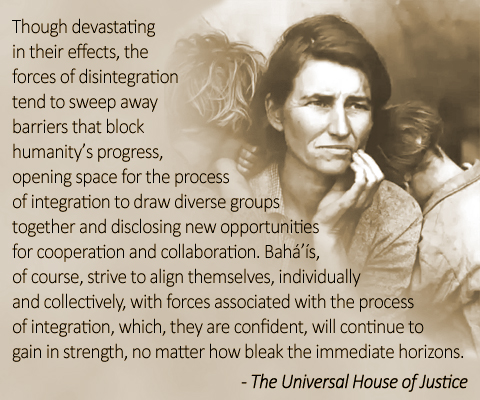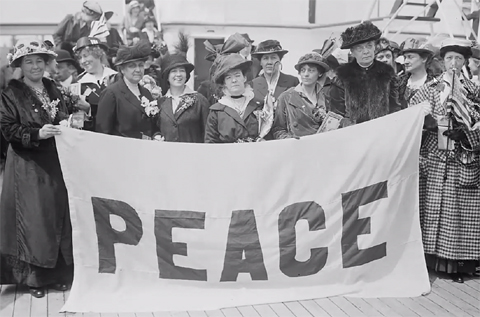|
 November
28, 2020
THE
20TH CENTURY: TALE OF WOE OR TURNING POINT?
November
28, 2020
THE
20TH CENTURY: TALE OF WOE OR TURNING POINT?
 Johanna
Jochumsdottir, an Icelandic-Canadian historian, recently made an
outstanding presentation in the “Big
Ideas”
series to an online
audience of 100. She took a counterintuitive approach to “Why History
Matters” in her overview of the 20th century: can we see that
astonishingly eventful period as anything but a catalogue of horrors?
Johanna
Jochumsdottir, an Icelandic-Canadian historian, recently made an
outstanding presentation in the “Big
Ideas”
series to an online
audience of 100. She took a counterintuitive approach to “Why History
Matters” in her overview of the 20th century: can we see that
astonishingly eventful period as anything but a catalogue of horrors?
Commonly,
recounting “the magnitude of the horrors” of the 20th century is seen
as history’s job. Dr. Jochumsdottir did not minimize the stream of
catastrophes, though her superb photographic selections were
suggestive, not brutal. She began with Queen Victoria’s Diamond Jubilee
in 1887, a massive celebration of the colonial era when few questioned
the apparent right of small but powerful nations to dominate huge
swaths of land and populations, or of men to rule over women.
We know the tragic results. Genocide in Tasmania, Congo, Turkey,
Rwanda…World War I. The “Spanish” flu. Fascism in Europe. World War II
dwarfs the first. Cold War (and its proxies: Korea, Vietnam,
Nicaragua…). Nuclear proliferation. Global terrorism. When 9/11
introduced a new century, it seemingly extended the tragedies of the
20th. This focus on loud and destructive currents in the 20th century –
via thoughtful historians and mass media – resulted in widespread
hopelessness, a belief in humanity’s inherent aggressiveness.
However, the destructive events are not the whole story of that
century. The Bahá’í community sees history as a dual process of human
social evolution. According to the Universal House of Justice, its
central governing authority, both processes serve to unite the human
family:
“[H]umankind as a whole is in the midst of an unprecedented
transition... [and we] see in the revolutionary changes taking place in
every sphere of life the interaction of two fundamental processes. One
is destructive in nature, while the other is integrative….The operation
of the former…[t]hough devastating in [its] effects…tend[s] to sweep
away barriers that block humanity’s progress, opening space for…new
opportunities for cooperation and collaboration.”
Jochumsdottir challenged her audience to look carefully at the nuanced
relationship between the disintegrative and integrative processes of
the 20th century and to see the consequent opening of new horizons for
humanity''. The emancipation of women, for instance, has
been a 500-year journey which accelerated greatly in the last hundred
years. Furthermore, the release of entire continents from the yoke of
colonialism, while turbulent, has seen enormous populations taking
charge of their own destinies.

In 1912, ‘Abdu’l-Bahá, the son of Bahá’u’lláh, the founder of the
Bahá’í
Faith, listed seven aspects of progress leading to the eventual and
inevitable unification of humanity. Dr. Jochumsdottir used these
“candles of unity” to inform a second tour through the century, this
time highlighting its integrative achievements.
Unity in the political realm.
The 1900s began
with rapid gains towards women’s suffrage. Women gathered in Europe
during and after the Great War, demanding peace and then a more just
Paris peace treaty. The establishment of the League of Nations in 1919
then led to the more robust United Nations Organization in 1945, and
later the formation of the African Union, the Organization of American
States, and other multinational coalitions.
Unity of thought in world undertakings.
Few
grasped this concept in 1912, but the U.N.’s Human Rights (1948) and
Millennium (2000) Declarations were profoundly visionary. We’ve seen
great advances in universal education, poverty reduction, life
expectancy and environmental consciousness, things barely imaginable in
1900.
Unity in freedom. The
emancipation of women
and the collapse of colonialism demonstrate the ever-stronger shining
of this “candle”.
Unity of religion. The
World Parliament of
Religions and other interfaith movements have grown. Now, religious
bigotry is routinely condemned, and commonalities among faiths are well
known and celebrated.
Unity of nations.
‘Abdu’l-Bahá predicted it
would “be securely established” in the 20th century; pandemics,
disasters and climate change reinforce its necessity.
Unity of races. Educated,
thoughtful people
almost universally endorse this, and theories of racial superiority
have been undermined.
Unity of language. This
great tool,
Bahá’u’láh’s prescription of a universal auxiliary language, continues
to evolve.
For Jochumsdottir, these lights of unity guide a mature, progressive
search for all the benefits of human solidarity. Humanity must
collectively adopt a different set of standards, and it gradually is.
In the 1990s alone, global conferences addressed universal education,
food and nutrition, the wellbeing of children, the environment, human
rights, population growth, the condition of women, and sustainable
development. “We have undergone a complete transformation since Queen
Victoria’s jubilee. The 20th century allowed us to see the essential
oneness of humanity,” Jochumsdottir concluded. This is why the
century of light was a turning point in the fortunes of the
human race. Bahá’u’lláh predicted a century and a half ago that “True
peace and tranquillity will only be realized when every soul will have
become the well-wisher of all mankind.”
|
|


